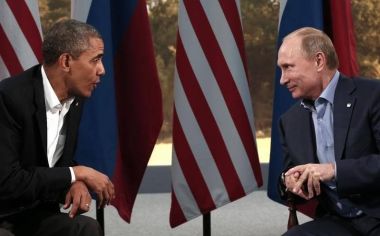Russia: Coalition against ISIS needed, but Assad must be involved
Russia is trying to create a co-ordinated body to fight ISIS in Syria, President Vladimir Putin has said.

Putin announced his intention as Iraqi Prime Minister Haidar al-Abadi revealed that Iraq has joined Russia, Iran and Assad's Syrian government in a coalition against ISIS.
"We are offering co-operation to the countries of the region – we are trying to create a coordinating body of sorts," Putin said, according to an excerpt of an interview with CBS, published by the Kremlin on Sunday.
The prospect of a Russian led coalition against ISIS adds further confusion to Washington's dilemma over the Syria situation. Although the US and many other Western governments have committed to destroying ISIS, they have also denounced Syria's President Bashar al-Assad's regime, which Russia has committed to supporting.
In the interview with '60 Minutes', Putin said the only option was to support existing government structures, not Western-backed rebel opposition.
"We support the legitimate government of Syria," he said in the interview aired on Sunday.
"And there is no other solution to the Syrian crisis than strengthening the effective government structures and rendering them help in fighting terrorism – but at the same time urging them to engage in positive dialogue with the rational opposition and conduct reform."
The White House has said Russia's support in fighting ISIS is welcome but that Assad's departure must be part of the solution.
His regime's atrocities against civilians, through frequent bombing of residential areas and other tactics, means that his ongoing survival as president is a recruitment tool for extremists, the White House has said.
Putin's comments come ahead of his meeting with Barack Obama at the UN general assembly in New York today. It is the first time the two have met formally in over two years. The West's relations with Russia became strained over Moscow's annexation of Crimea in Ukraine last year and its ongoing support for separatist rebels.
Despite the US' ongoing hostility towards Assad, David Cameron has softened his tone towards the Syrian President's rule. Alongside Obama and France's President François Hollande, he previously insisted that Assad's removal from power must be part of any peace deal.
However in a speech at the UN general assembly, he is due to say that Assad could remain temporarily in power at the head of a transitional government.
Cameron's change of tone comes as he is under pressure to demonstrate he has a coherent strategy for Syria before asking Parliament to vote on extending Britain's air strikes on ISIS in to Syria. Currently Britain supports air strikes against ISIS in Iraq but not Syria.











